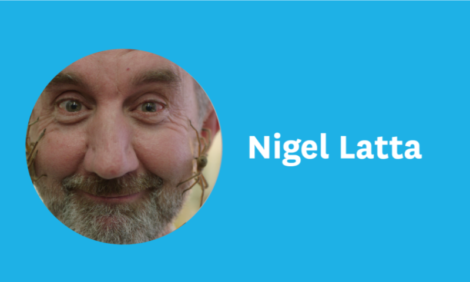
Xerocon speaker Nigel Latta on the science of influence

Welcome to the first post in our series introducing the Xerocon Brisbane 2019 keynote speakers. Join us for five minutes with Nigel Latta, a New Zealand clinical psychologist who has worked for over two decades in forensic psychology and family therapy. He’s written eight books, which have been published in 19 countries, and has a television career that has spanned almost a decade. He’s also a TEDx speaker. Here is Nigel in his own words.
Your brain is awesome. That’s a word we hear way too much these days. People use it to describe everything from their night out to their sandwich. Both of these things may have been quite pleasant, but I’d be pretty confident they weren’t truly, genuinely, profoundly awesome.
Your brain, on the other hand, is truly, genuinely, profoundly, unquestionably, awesome.
You have over 80 billion neurons in your brain, each with thousands of connections to their neighbouring brain cells, creating roughly 100 trillion connections. Everything you are, everything you feel and see and smell, and think and imagine, and worry about and ponder, is the product of an infinitely complex electrical ballet in your brain.
If you’re a science junkie, like I am, this is all very cool. But what’s it got to do with accountants, bookkeepers, and financial advisors? Neuroscience is interesting, for sure, but what’s the practical relevance? How can it help you do what do better?
We’re all trying to do the same thing
I think we can agree that if human behaviour worked like accounting and bookkeeping rules, the world would be a calmer, more peaceful place. Everything would be more rational and less reactive. I’m not talking about the actual humans who work in this field — sadly you’re all just as irrational and flawed as the rest of us — but the underlying principles of accounting and bookkeeping.
We are not neatly balanced ledgers with clear lines of accountability from one column to the next. We are not closed systems with reliable relationships between the underlying ‘numbers’ of our thoughts and feelings. Our behaviour often does not add up.
Yet despite that we still have to find a way to work with each other and get things done.
Which is why playing nicely with others is one of the defining features of our species. It’s literally hardwired into our brains. We have systems we’re born with that steer us in the direction of teamwork.
Understanding that can make the business of doing business a lot easier, because the thing we’re all engaged in, every single day, is the business of influence. We are trying to get other people to do the things we want them to do.
Influence
So how do you influence others? The good news is that even though the underlying neuroscience of influence is almost inconceivably complex, the strategies of influence are actually simple.
I must warn you though, that when I say simple, I really do mean simple.
I have pursued the art and science of influence for over 25 years. In my clinical career, I decided early on that the most powerful lessons would come from the most difficult cases. So I sought out the kinds of cases sensible people would run a mile from. I have worked in prisons with criminals who have done the worst kind of things. I’ve worked with families whose issues go back for generations. I once worked with the rudest 12-year-old girl in the world. If the vote of the Xerocon audience goes that way on the day I present, I’ll tell you about her.
And what’s the first step to having influence? You have to get people’s attention. You have to get them listening.
Two powerful words
There’s a simple way you can be more influential in your personal and professional life. There’s a simple way you can build stronger, more resilient teams, and build loyalty in your clients, and foster more resilient families and relationships as well. And even though the underlying neuroscience is so complicated it almost makes your head hurt, the strategy itself is so simple it can be summed up in just two words. It’s not infallible, and it isn’t some kind of weird mind-control trick. It’s just a simple thing which more likely than not will get you closer to where you need to be.
Here’s the vexing part, though. I can’t tell you those two words now. You need the context first, because without that context you’ll probably just push it aside. I don’t want you to do that. I want you to take a moment to sit with this thing I’m going to give you. It’s simple but it’s powerful. It changes lives. In fact, in over two decades of working with tens of thousands of people, it’s the only thing I’ve ever found that does change lives.
So if that sounds like something you might be interested in, I’ll see you on September 4 in Brisbane. And remember to vote with a simple show of hands once we get going as to whether you want to hear the story of the rudest 12-year-old in the world. Personally I hope you vote yes.
It’s a good story.
The post Xerocon speaker Nigel Latta on the science of influence appeared first on Xero Blog.
Source: Xero Blog






